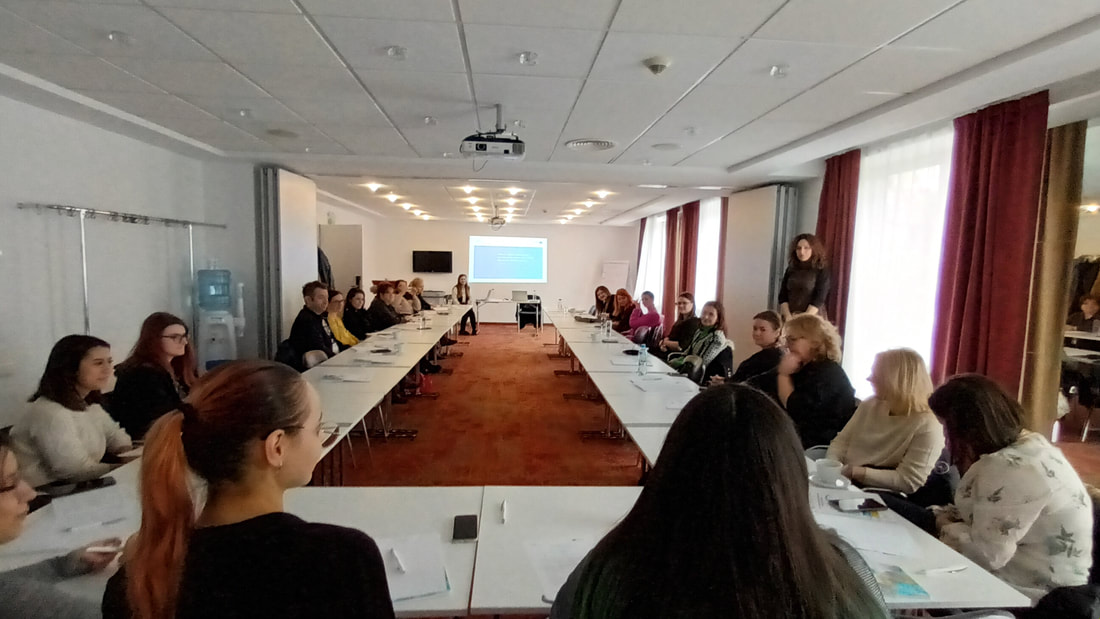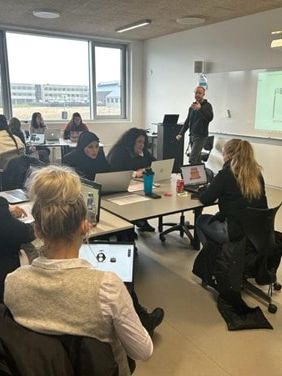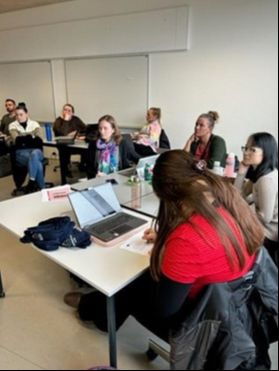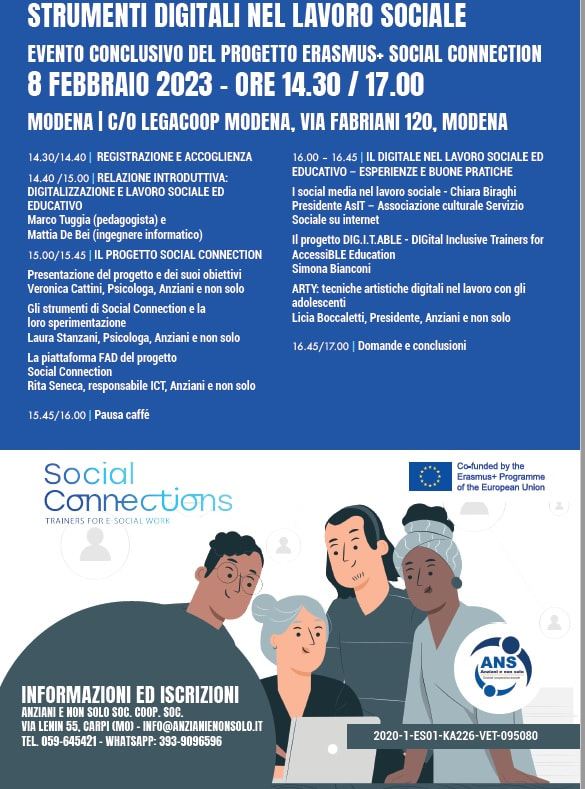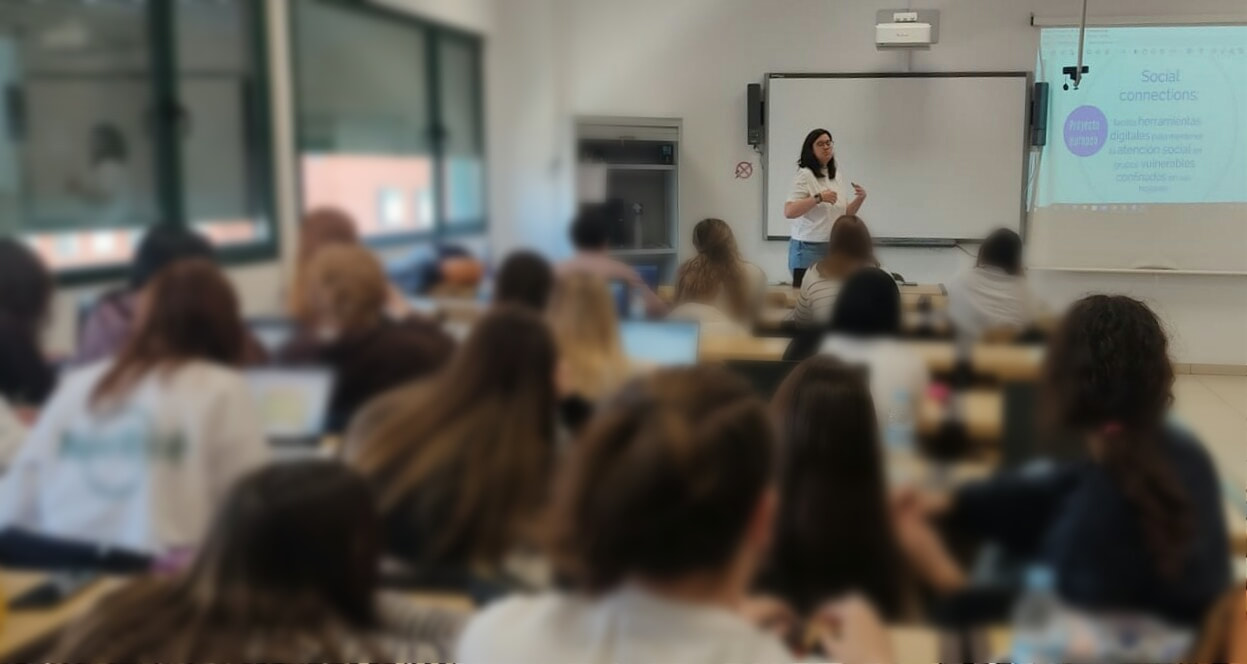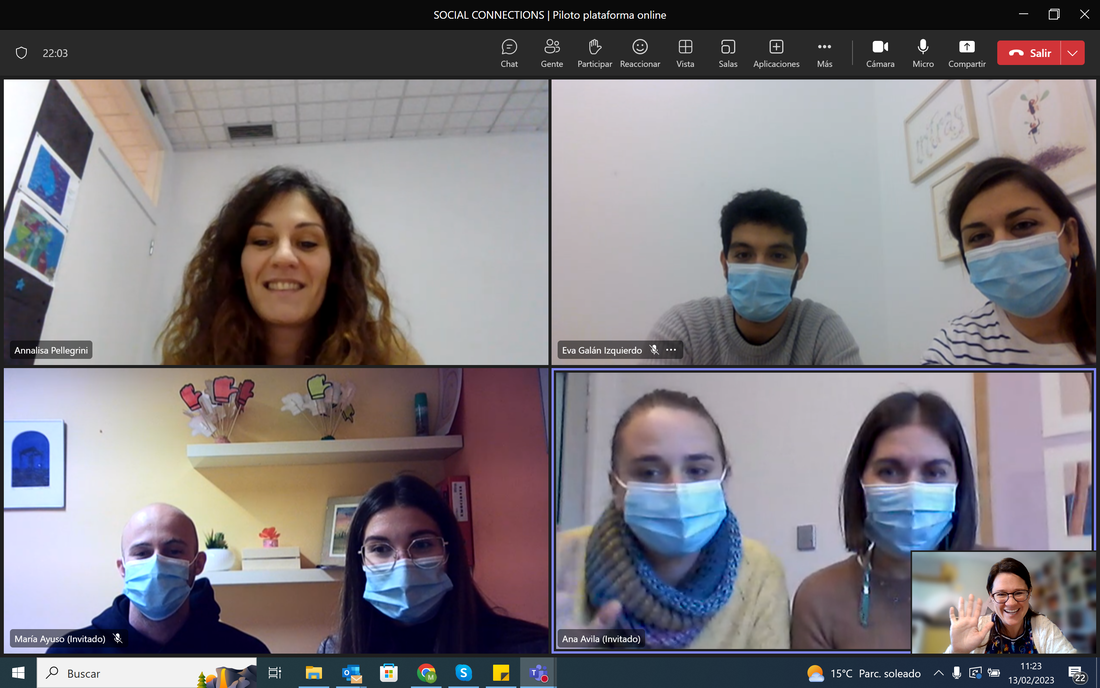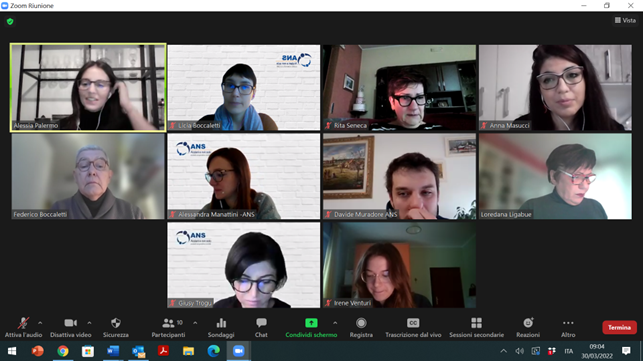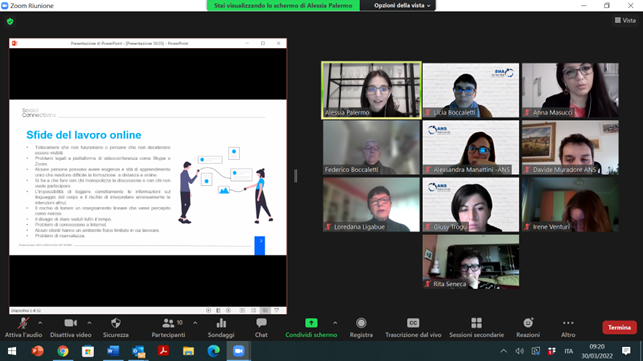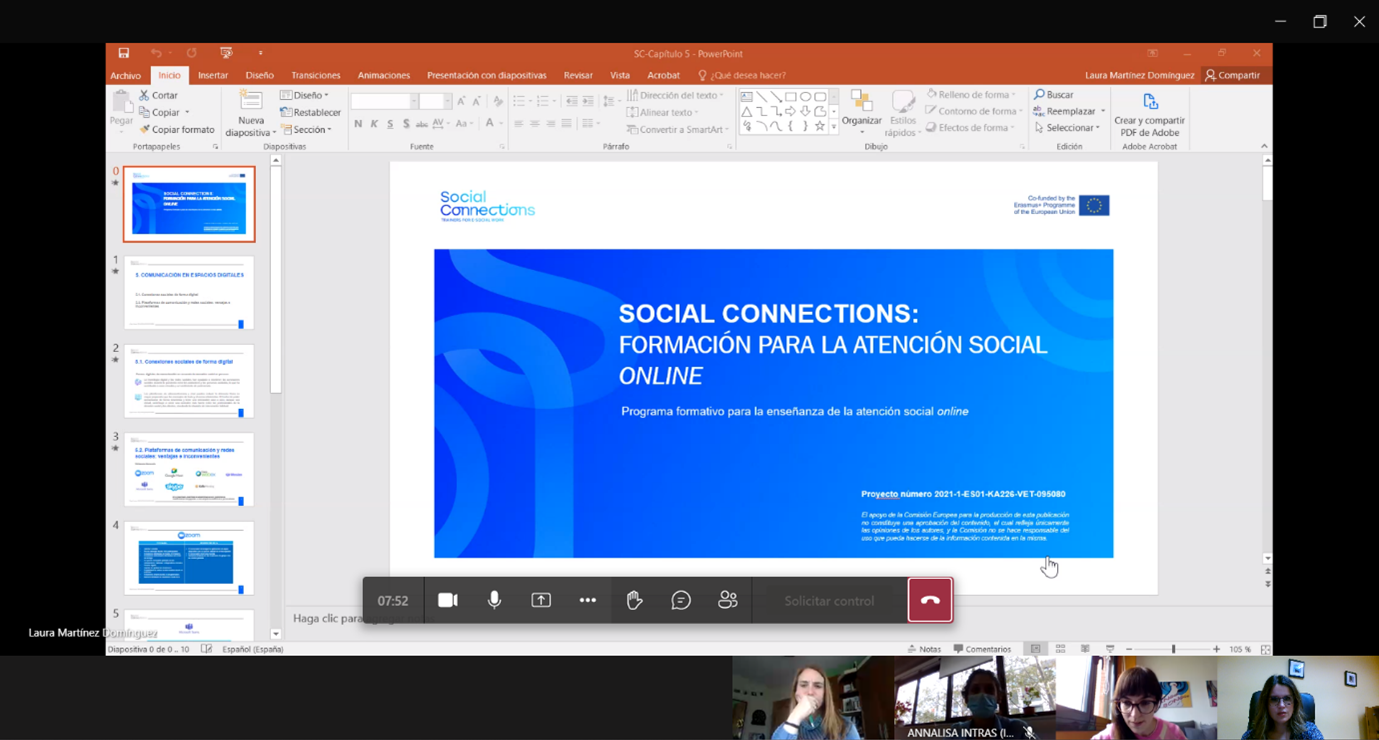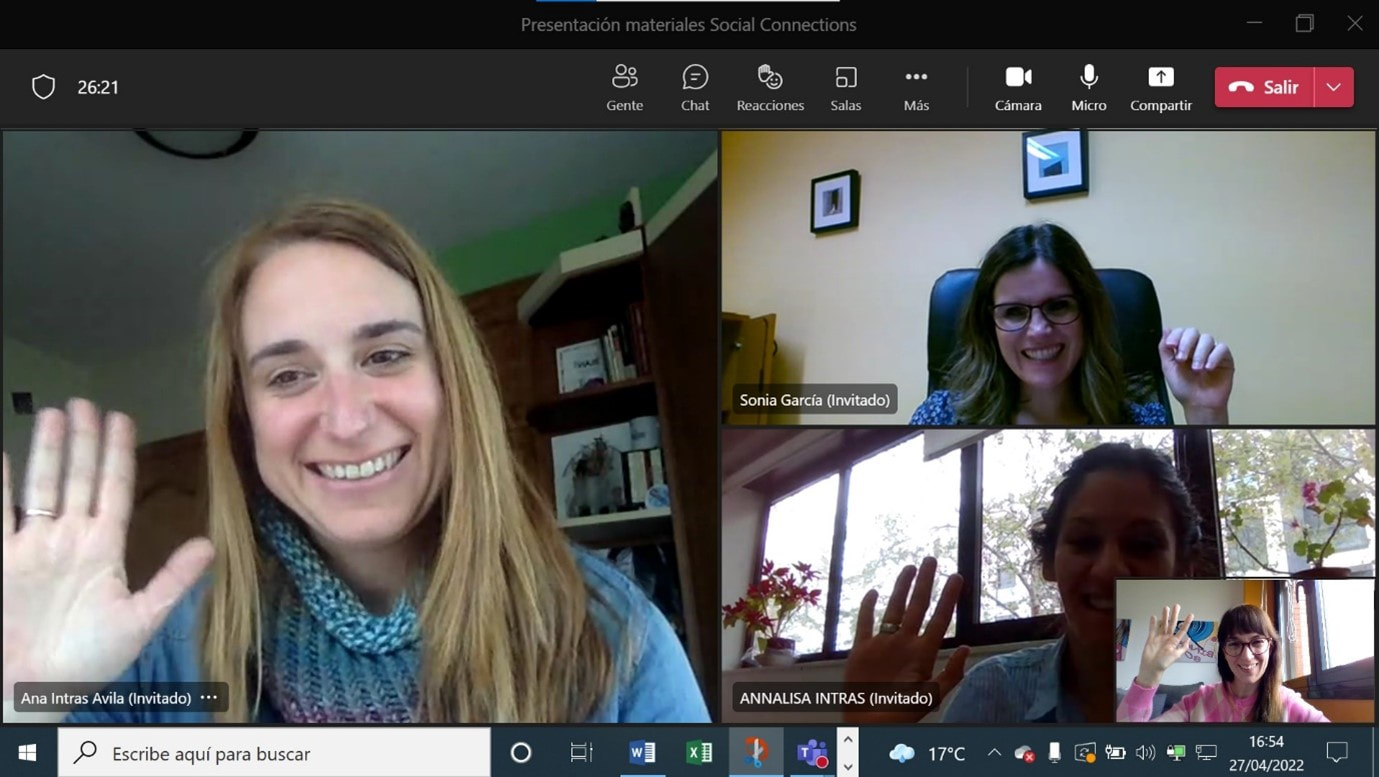Multiplier events
Each of the partner countries organized within the last month of the project one final event with the aim to present the Scoial Connections initiative, its objectives and results.
Romania
The ME in Romania took place in Bucharest on the 27th February and it brought together 22 participants. The participants were social workers, educators and trainers, psychologists, students at the Faculty of Social Work
The event lasted for approximately 3 hours and it received a very good feedback.
The event lasted for approximately 3 hours and it received a very good feedback.
Denmark
In Denmark there were organised 2 events, of 3 hours each, that brought together 37 participants aged 23 – 51 years.
Professions: Lecturers/trainers, social workers and professional educators.
The project and its results as well as the events were very well received.
Professions: Lecturers/trainers, social workers and professional educators.
The project and its results as well as the events were very well received.
Italy
The Italian ME was organized as a seminar on the topic of promoting digital tools in digital social work.
The conceptual background and context in which the project was born, its objectives, the population group it is aimed at, and the results that have been achieved were presented. The specific digital tools developed by the project were explained in detail and their function was shown. A number of professionals in the social field who are very close to the topic of digital have also been invited to the seminar to talk about their experience and their ideas.
The conceptual background and context in which the project was born, its objectives, the population group it is aimed at, and the results that have been achieved were presented. The specific digital tools developed by the project were explained in detail and their function was shown. A number of professionals in the social field who are very close to the topic of digital have also been invited to the seminar to talk about their experience and their ideas.
Spain
Coinciding with the last day of the project, we present the Social Connections tools between 33 professionals from social sectors, social workers, academics and other professionals in the field related to this project funded by Erasmus+. In addition, we have attended two project managers and a social worker in the mental illness sector, to share experiences.
The event was held face to face in the offices of the Faculty of Education and Social Work, of the University of Valladoli and it was divided into three parts.
First of all, it exposed the context in which the project was devised based on an online presentation (Prezi). Then he has entered the theoretical background, also making use of the official website of the project. The reason for being of the manual and the curriculum has been explained, to give way more in detail to the digital pedagogical tools
The theoretical explanation has followed a practical session in which participants have become familiar with digital tools, choosing based on their interests in which of them they wanted to deepen. A ideas session has also been made about its usability in the professional environment both at the academic level and in social care.
We have had the collaboration of one of the social workers who were part of the pilot, who has been able to share their experience and view in the professional application of the tools.
Finally, the Padlet collaborative platform has been used to carry out the evaluation session and that the participants anonymously share their comments about it.
The event was held face to face in the offices of the Faculty of Education and Social Work, of the University of Valladoli and it was divided into three parts.
First of all, it exposed the context in which the project was devised based on an online presentation (Prezi). Then he has entered the theoretical background, also making use of the official website of the project. The reason for being of the manual and the curriculum has been explained, to give way more in detail to the digital pedagogical tools
The theoretical explanation has followed a practical session in which participants have become familiar with digital tools, choosing based on their interests in which of them they wanted to deepen. A ideas session has also been made about its usability in the professional environment both at the academic level and in social care.
We have had the collaboration of one of the social workers who were part of the pilot, who has been able to share their experience and view in the professional application of the tools.
Finally, the Padlet collaborative platform has been used to carry out the evaluation session and that the participants anonymously share their comments about it.
Pilot sessions
MOOCs for C-VET in digital social work - pilot sessions
The third intellectual output of the project consisted in the develpopment of an e-learning course for the C-VET of social professionals on how to implement e-social work activities: the e-learning, developed by participants to the training for trainers as a result and practical implementation of what they learned, will then remain available as an open educational resource for social care workers across Europe.
Below, we invite you to read about the pilot sessions organized by the Social Connections partners.
Below, we invite you to read about the pilot sessions organized by the Social Connections partners.
Intrans
The participants were recruited within the INTRAS resources, where the Social Connections materials can be applied both in Personal Assistance, as in Residences, as in Rehabilitation Center or Day Center, depending on the profile and situation of the users.
IO3 training was promoted as the use of innovative and digital tools to apply to vulnerable groups that, for whatever reason, are in a situation of confinement.
The session was held online, since we brought together 7 interested parties from 4 different centres. Two of them had previously participated in the first Social Connections pilot, so they were familiar with the subject. The others were introduced to the theoretical framework and the 4 methodologies and tools developed by the Consortium were explained. In a second part of practical application, we focus on one of the modules to review in depth.
All the participants valued both the audio-visual material and the ease of use of the platform very positively. On the other hand, regarding the content, they were very positively surprised by the learning objectives that can be achieved with this methodology and they all followed the instructions to comply with the proposed activity through the Minecraft game.
The trainers generally maintain that, in this specific case of game-based learning, they have to choose very carefully the profile with the appropriate skills, in addition to giving great importance to the figure of the facilitator, who at all times must be aware of the good use of technology.
It was very well valued to have the lessons on the platform to use them at the pace of each one, planning individually or as they see candidates for the use of the different methodological proposals.
IO3 training was promoted as the use of innovative and digital tools to apply to vulnerable groups that, for whatever reason, are in a situation of confinement.
The session was held online, since we brought together 7 interested parties from 4 different centres. Two of them had previously participated in the first Social Connections pilot, so they were familiar with the subject. The others were introduced to the theoretical framework and the 4 methodologies and tools developed by the Consortium were explained. In a second part of practical application, we focus on one of the modules to review in depth.
All the participants valued both the audio-visual material and the ease of use of the platform very positively. On the other hand, regarding the content, they were very positively surprised by the learning objectives that can be achieved with this methodology and they all followed the instructions to comply with the proposed activity through the Minecraft game.
The trainers generally maintain that, in this specific case of game-based learning, they have to choose very carefully the profile with the appropriate skills, in addition to giving great importance to the figure of the facilitator, who at all times must be aware of the good use of technology.
It was very well valued to have the lessons on the platform to use them at the pace of each one, planning individually or as they see candidates for the use of the different methodological proposals.
Aproximar, Portugal
The training pilot, in Portugal, was delivered through a total of 6 online sessions distributed through 21 hours of training. 14 participants took part and 5 finished the entire programme. It started with a welcoming session where participants had the opportunity to better understand the aims and features of this pilot, namely an explanation of the e-learning platform where they had access to the training content and an explanation of the practical part of implementing/testing a digital tool in their professional context.
The first part of the training was dedicated to the content produced in IO2, as an introduction to the relevance of ICT in social intervention; the second part of the training aimed to present and get more familiar with the digital tools proposed for IO3 (Narrative Gerontology; Digital Art; Blackout Poetry; and Game based learning). The last session was dedicated to the presentations of this practical implementation, where participants had the opportunity to discuss their achievements and constrains during the delivery of a digital tool in their social intervention.
In total, 4 professionals tested a digital tool in their professional context. It is important to highlight that participants work with different target groups (children and youth, vulnerable adults, and elderly people), promoting a deeper discussion and understanding on how these tools can be useful and effective in social intervention.
In general, participants were satisfied with the training action, being the results of the evaluation questionnaire very positive.
The first part of the training was dedicated to the content produced in IO2, as an introduction to the relevance of ICT in social intervention; the second part of the training aimed to present and get more familiar with the digital tools proposed for IO3 (Narrative Gerontology; Digital Art; Blackout Poetry; and Game based learning). The last session was dedicated to the presentations of this practical implementation, where participants had the opportunity to discuss their achievements and constrains during the delivery of a digital tool in their social intervention.
In total, 4 professionals tested a digital tool in their professional context. It is important to highlight that participants work with different target groups (children and youth, vulnerable adults, and elderly people), promoting a deeper discussion and understanding on how these tools can be useful and effective in social intervention.
In general, participants were satisfied with the training action, being the results of the evaluation questionnaire very positive.
SOSU Ostjylland VET, Denmark
The participants were recruited at SOSU Ostjylland VET college, training social- and healthcare helpers and social- and healthcare assistants (EQF 3+4) to work primarily in nursing homes, in home care and in hospitals and in psychiatry.
The IO3 training was promoted as a relevant input to the trainers’ teaching experience, adding new perspectives to their teaching in terms of how to apply an online approach to engage vulnerable groups in meaningful activities promoting and enhancing digital creative skills, when restricted from physical attendance.
There were 6 participants, 4 occupational therapists and 2 nursesd, aged between 36 – 64 years.
Due to a tight training schedule, the participants were asked to prioritize what workshops to perform, as it was not possible to perform all 4 MOOCS/workshops within the scheduled timeframe. The selection of workshop was an open choice for the participants.
Due to a tight training schedule, the participants were asked to prioritize what workshops to perform, as it was not possible to perform all 4 MOOCS/workshops within the scheduled timeframe. The selection of workshop was an open choice for the participants.
All the participants got a “hand on” experience performing the workshop exercises. The feedback was positive regarding the actual workshops and what to be aware of when delivering training with the target group. All trainers liked the voiceover function, improving the user experience for illiterate users.
The participants were recruited at SOSU Ostjylland VET college, training social- and healthcare helpers and social- and healthcare assistants (EQF 3+4) to work primarily in nursing homes, in home care and in hospitals and in psychiatry.
The IO3 training was promoted as a relevant input to the trainers’ teaching experience, adding new perspectives to their teaching in terms of how to apply an online approach to engage vulnerable groups in meaningful activities promoting and enhancing digital creative skills, when restricted from physical attendance.
There were 6 participants, 4 occupational therapists and 2 nursesd, aged between 36 – 64 years.
Due to a tight training schedule, the participants were asked to prioritize what workshops to perform, as it was not possible to perform all 4 MOOCS/workshops within the scheduled timeframe. The selection of workshop was an open choice for the participants.
Due to a tight training schedule, the participants were asked to prioritize what workshops to perform, as it was not possible to perform all 4 MOOCS/workshops within the scheduled timeframe. The selection of workshop was an open choice for the participants.
All the participants got a “hand on” experience performing the workshop exercises. The feedback was positive regarding the actual workshops and what to be aware of when delivering training with the target group. All trainers liked the voiceover function, improving the user experience for illiterate users.
Anziani e non solo, Italy
Piloting was performed in January 2023 and the 6 participants were recruited from within the ANS network, to make it possible to apply the tools with the diverse user base they interface with (Social workers, caregivers, elderly people, health care workers...).
After an initial presentation of the e-course, time was allowed for participants to complete it. They were given the opportunity to choose which tool might be most suitable based on the profile of their users to elaborate on it. The majority of participants selected Blackout Poetry and the application of Blackout Bard as their theme for further study.
The MOOC has been promoted as a useful tool to have new skills and input to put into practice with users and in training contexts, opening up a new perspective on social work that also includes the use of technological tools.
Most of the participants had the opportunity to apply the tools presented by the MOOC with their users. All participants left positive feedback with respect to the selected tools and their use. They were able to observe what aspects should be taken into consideration when delivering training with final users.
Specifically, 4 participants got to implement the techniques learned from MOOCs:
After an initial presentation of the e-course, time was allowed for participants to complete it. They were given the opportunity to choose which tool might be most suitable based on the profile of their users to elaborate on it. The majority of participants selected Blackout Poetry and the application of Blackout Bard as their theme for further study.
The MOOC has been promoted as a useful tool to have new skills and input to put into practice with users and in training contexts, opening up a new perspective on social work that also includes the use of technological tools.
Most of the participants had the opportunity to apply the tools presented by the MOOC with their users. All participants left positive feedback with respect to the selected tools and their use. They were able to observe what aspects should be taken into consideration when delivering training with final users.
Specifically, 4 participants got to implement the techniques learned from MOOCs:
- Three participants tested Blackout poetry and Blackout Bard in three different target groups:
- During a training with care workers;
- With an online group of informal caregivers;
- During an online training with educators, psychologists, social workers and students.
- During a training with care workers;
- One participant tested Sketchpad during an online training with educators, psychologists, social workers and students.
Working on The Tool-box for e-social work
The second intellectual output of the project has been keeping the partnership excitingly busy. Using the Curriculum to teach e-social work from our first result we have piloted and conducted training workshops with trainers from the social work sector.
The training was focused on a learning by doing experience and integrated the basic principles of online teaching in the social sector. Specifically, this part has been devoted to engage participants in the co-development of a training module on digital tools for social workers.
Below we invite you read about the experience of the piloting in the partner countries.
The training was focused on a learning by doing experience and integrated the basic principles of online teaching in the social sector. Specifically, this part has been devoted to engage participants in the co-development of a training module on digital tools for social workers.
Below we invite you read about the experience of the piloting in the partner countries.
ITALY
In Italy, the Social Connection pilot training has taken place the 30th and 31st of March 2022. The training has been designed in an online format, through a videoconferencing platform, that allowed the execution of training aimed at developing e-social work skills. Participants are part of the internal staff of the ANS cooperative and they were chosen based on their role, skills and development possibilities on this topic. Specifically, 8 professionals participated: a neuropsychologist, a social worker, two project managers, an ICT developer, two expert social workers’ trainers and a trainee.
The training was divided into two specific parts. During the first day, the theoretical aspects underpinning the training were analysed, in detail delving into several chapters of the project's IO1 manual and performing a number of activities and exercises to test and solidify knowledge. These were recognised by the participants as very relevant, especially the group activities, because they allowed them to confront each other and integrate different points of view. The second day was dedicated to the co-creation of a training module on the Blackout poetry technique. Together with the participants, we looked at how this technique can be used with users with vulnerabilities, such as people with disabilities, the elderly, and people with a low level of schooling. Finally, the participants tried their hand at creating an online poem themselves in order to fully understand the mechanism.
Participants enjoyed the training, rating its execution, content, and methods as highly satisfactory (on a scale of 1 to 5, all responses are between 4 and 5). Among the comments left in the evaluation questionnaire are relevant:
“The trainers were very clear and explained in detail the concepts and content of the course. I really appreciated the activities that allowed to identify with the final recipients and grasp positive and negative aspects of the digital approach.”
“The group exercises were useful both for the exchange that was created and for the opportunity to learn about and experiment with new tools.”
“The trainers were very clear and explained in detail the concepts and content of the course. I really appreciated the activities that allowed to identify with the final recipients and grasp positive and negative aspects of the digital approach.”
“The group exercises were useful both for the exchange that was created and for the opportunity to learn about and experiment with new tools.”
SPAIN
We implemented the Social Connections pilot course at INTRAS Foundation (Spain) between May and July 2022. Our main target group, amongst others, are people living with severe and prolonged mental illness. The IT abilities of this target group are very variable, so this project is especially interesting for our professionals to learn the best way to effectively work online with our clients. This time, we had the participation of three social workers’ trainers working at different facilities (residential homes, psychosocial rehabilitation centers, etc.) of INTRAS in different cities (Ávila, Zamora and Valladolid), so the pilot was held online.
The theoretical part of the training was held on a single day (four training hours), being the participants provided with all the related documentation. The practical part of the training was focused on Game-based learning and lasted for more than six sessions (lasting 2 hours each training session), as some parts of the work needed to be modified and improved. The proposed topic was a big challenge for the Spanish trainers, as none of them were fond of videogames. Nevertheless, they were really motivated to learn and the process became a very interesting experience for the three of them.
First of all, it was complicated to distinguish between several related concepts as gamification, game-based learning or gamified education. Fortunately, we had the expert advice from the partner Virtual Campus, who helped the team to create a clearer picture about this new field. Then, choosing an appropriate game to be used with our clients was complicated too. There were plenty of options and choosing only one meant several discussions and trials. Finally, Minecraft was the video game chosen to train different abilities as organization, team building, critical thinking, ability to focus on the important things, problem solving or learning motivation.
First of all, it was complicated to distinguish between several related concepts as gamification, game-based learning or gamified education. Fortunately, we had the expert advice from the partner Virtual Campus, who helped the team to create a clearer picture about this new field. Then, choosing an appropriate game to be used with our clients was complicated too. There were plenty of options and choosing only one meant several discussions and trials. Finally, Minecraft was the video game chosen to train different abilities as organization, team building, critical thinking, ability to focus on the important things, problem solving or learning motivation.
The INTRAS’ participants in the Social Connections pilot course are very happy with the results achieved and highly motivated to use online tools when working with their clients:
“I’ve never imagined I could use videogames to work and motivate the people I work for!”, “I feel much more confident now to use online tools to interact with my clients”.
“I’ve never imagined I could use videogames to work and motivate the people I work for!”, “I feel much more confident now to use online tools to interact with my clients”.

